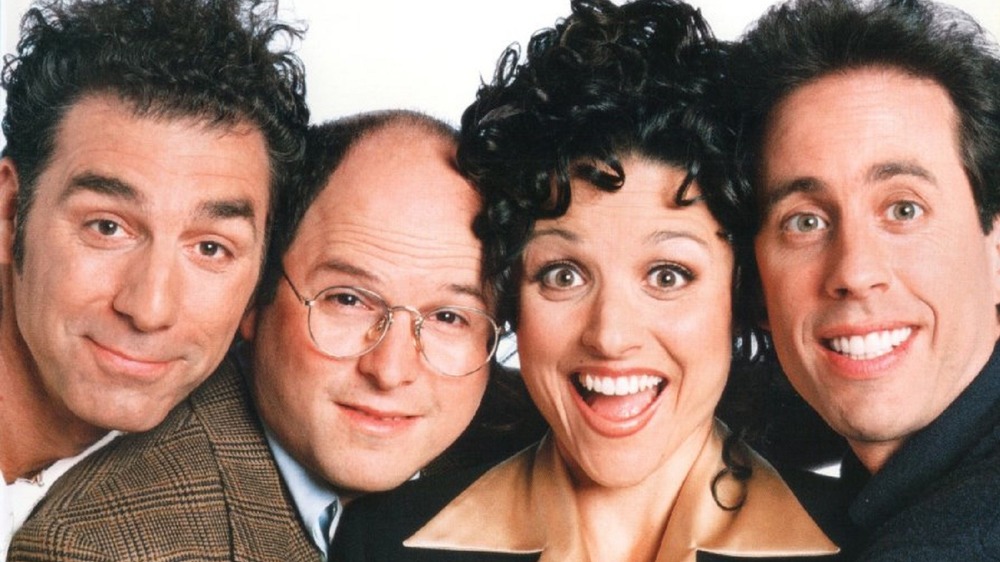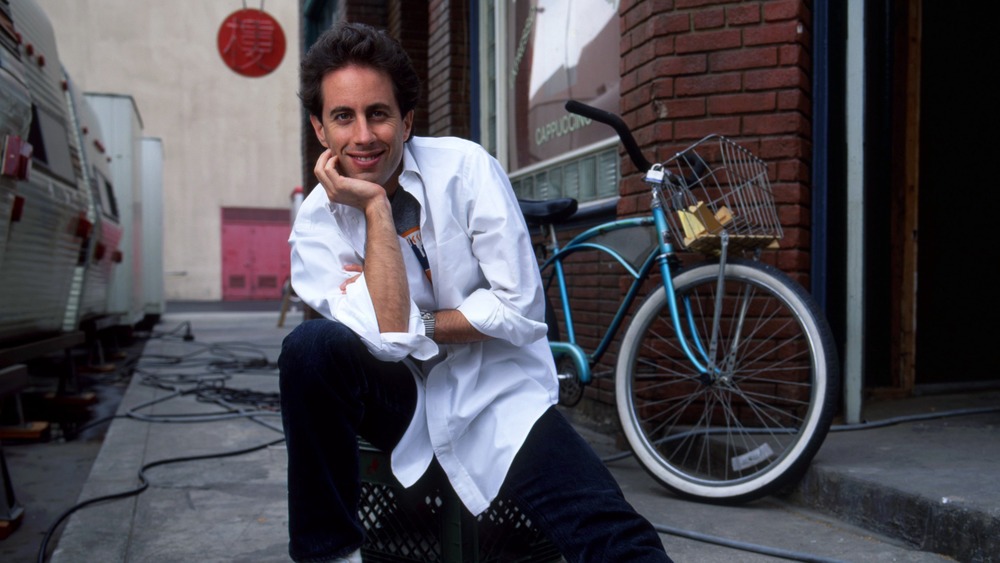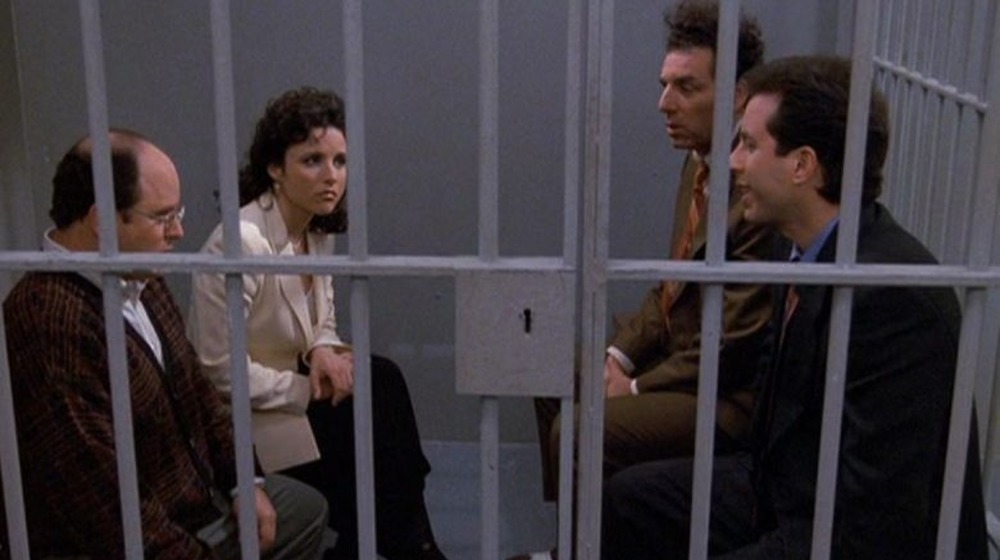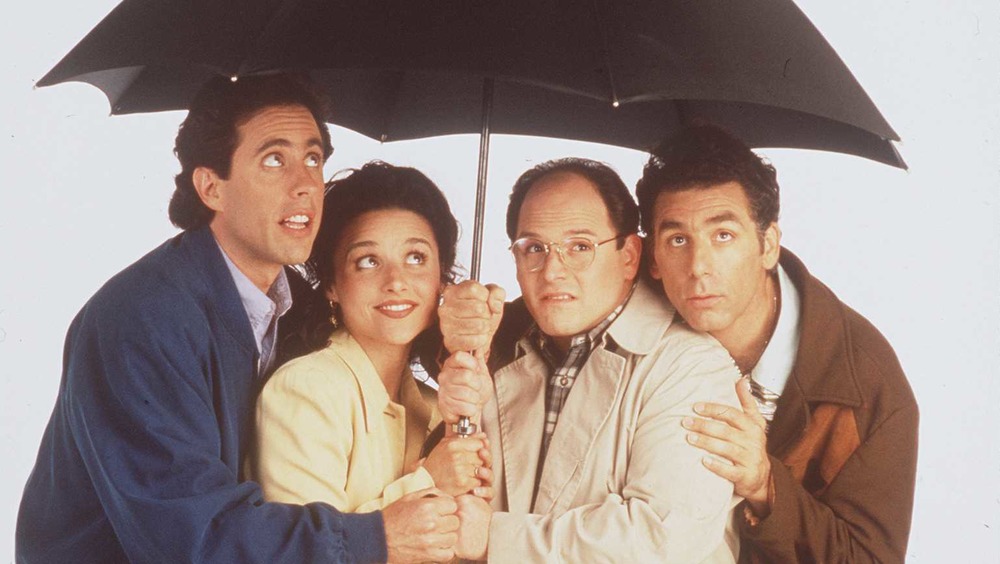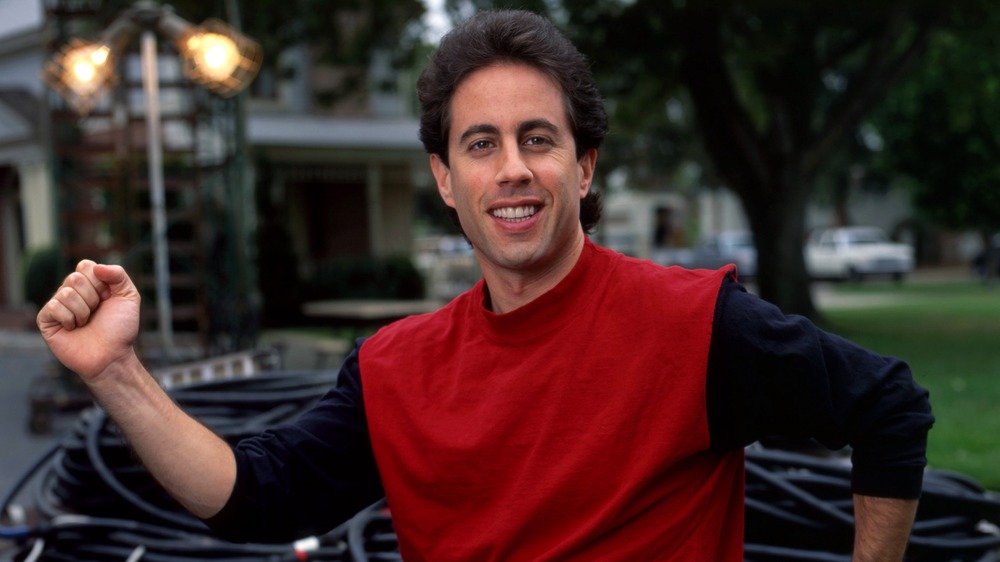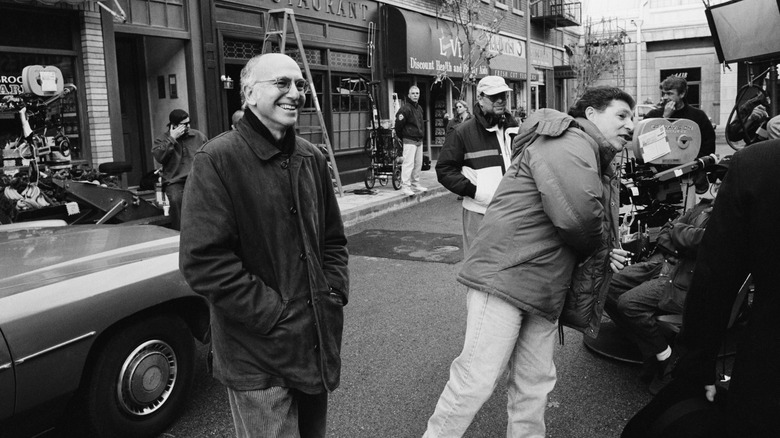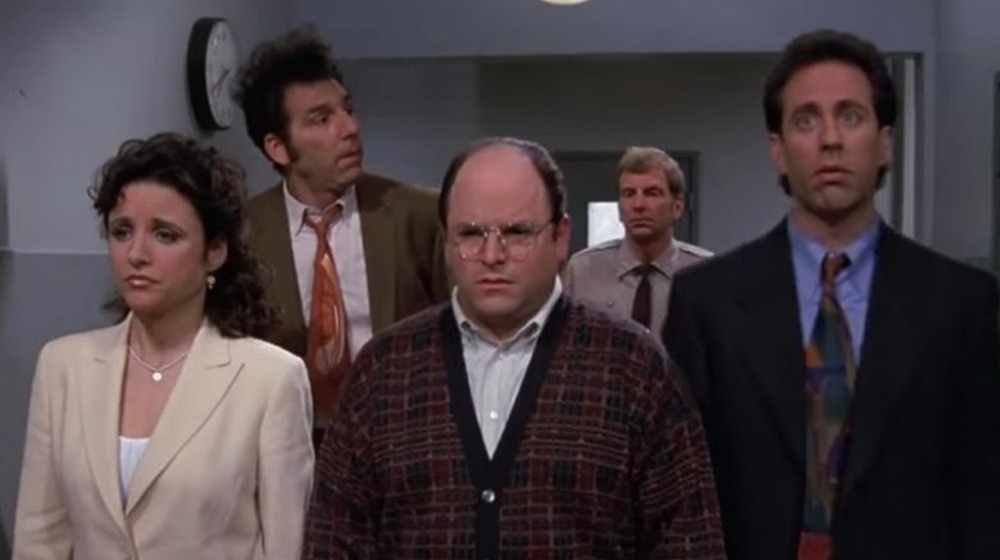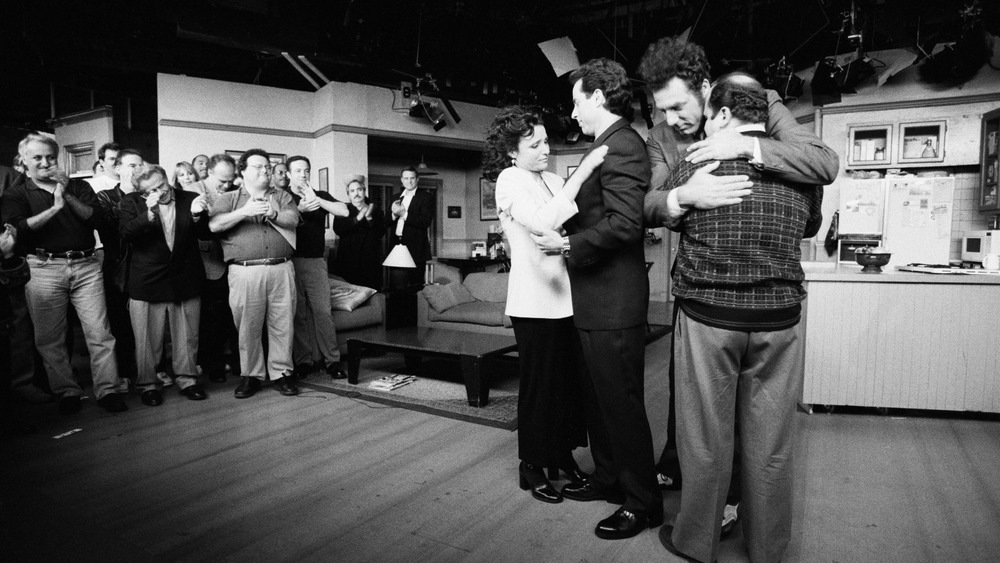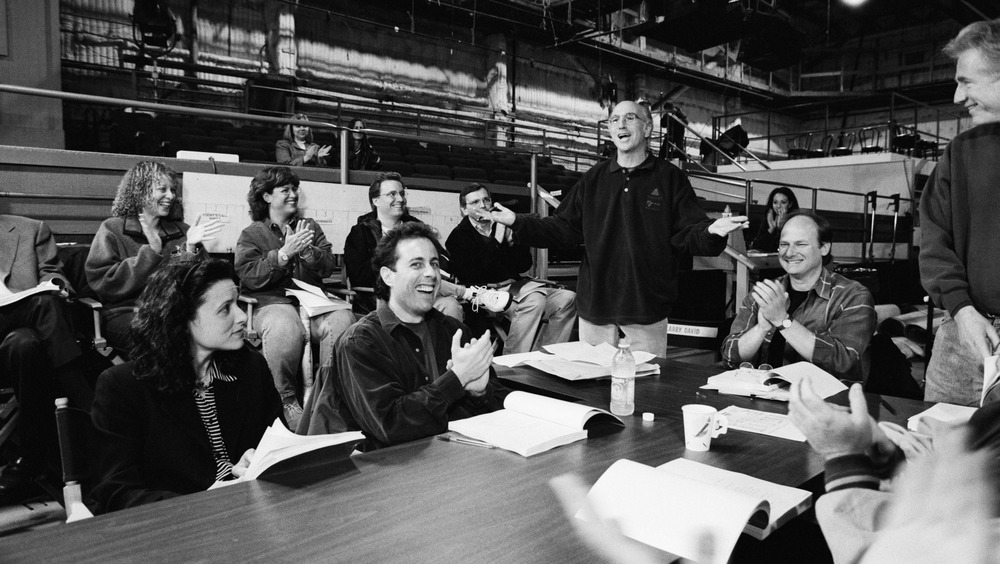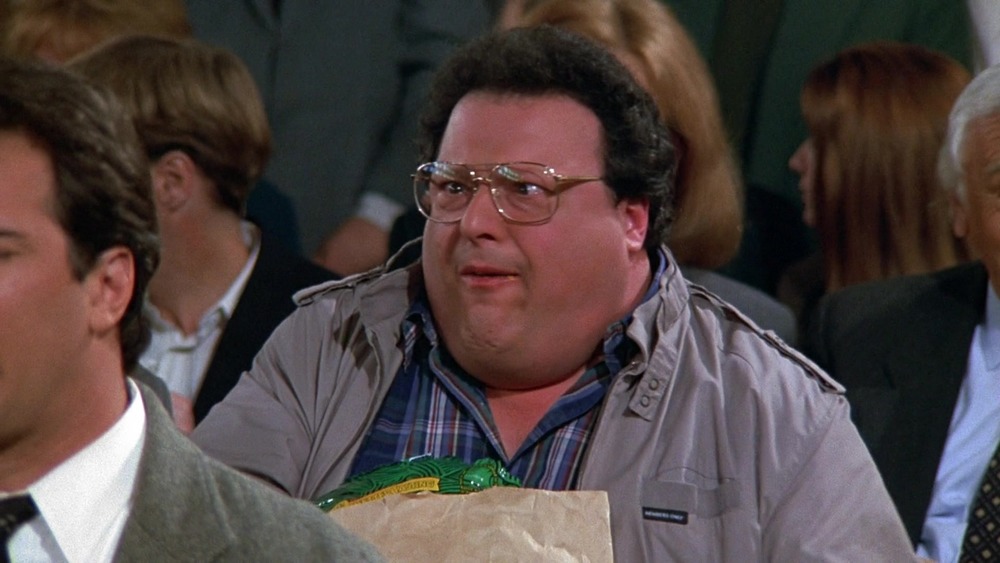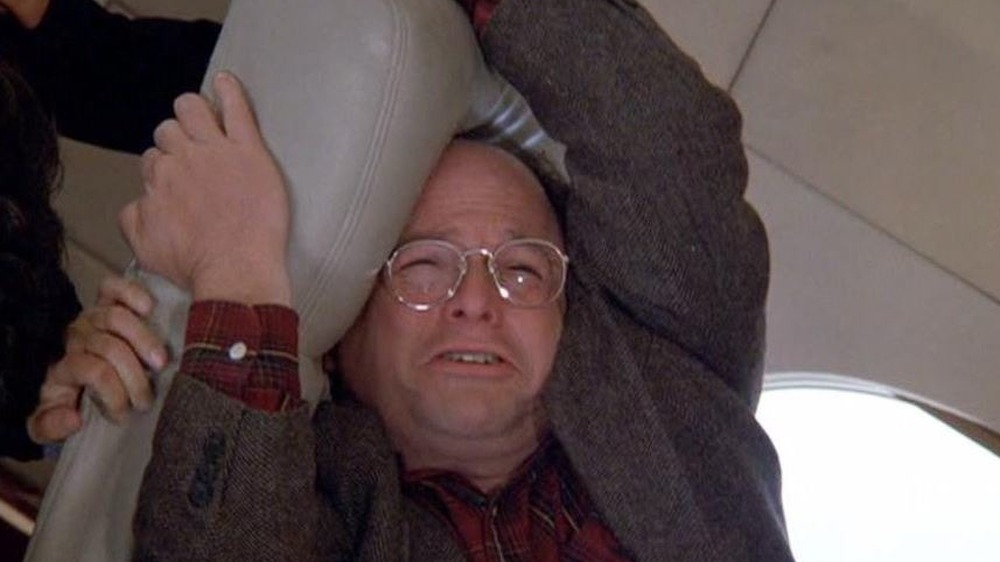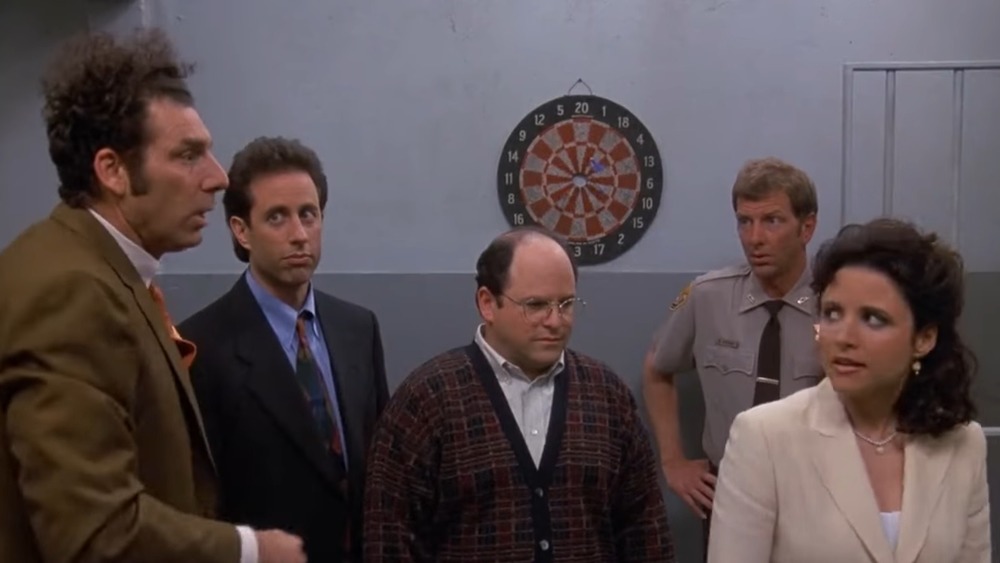What The Final Days On The Set Of Seinfeld Were Like
Seinfeld was a true phenomenon. For most of its run, the "show about nothing" — except the everyday troubles of Jerry (Jerry Seinfeld), George (Jason Alexander), Elaine (Julia Louis-Dreyfus), and Kramer (Michael Richards) — was the biggest thing on TV. As the nickname implies, it changed the rules of the medium. It proved sitting around and talking could be just as exciting as the usual sitcom shenanigans, and it proved characters didn't have to be likable to be beloved all over the world.
And then, just when the show was more popular than ever and seemed to have nowhere to go but up, it all came to an end with one of the most polarizing finales in TV history, an hour-long survey of the cast's many crimes over the past decade that ended with them sharing a jail cell and revisiting the conversation that opened the very first episode. Love it or hate it — and you'll find plenty of arguments both ways — the end of Seinfeld was a historic event. What was it like to be there? Here's what we've found out.
Jerry Seinfeld took a loss to make sure he'd come out on top
Seinfeld's ratings continued climbing throughout its run, and there was no telling how high they could've gotten if it had stayed on the air. But Jerry Seinfeld didn't see it that way. As he recalled on a season 9 DVD featurette, "The only way we'll know is when we pass it." He wasn't interested in watching the show decline as it entered its second decade. Like George Costanza once said, he decided to "leave them wanting more."
It was a logical creative decision, but it didn't make sense to everyone. In a New York Times story about the filming of Seinfeld's last season, executive producer George Shapiro said, "I think the NBC executives were totally shocked that he'd walk away from that much money." Then again, by that point, Seinfeld and his castmates had already made enough money off of Seinfeld to last them the rest of their lives — and so far, it has.
NBC didn't want to let Seinfeld end
Seinfeld made its cast and crew a whole lot of money, and it made their bosses at NBC a whole lot more. So you can imagine the producers didn't want to give up their golden goose without a fight.
To celebrate the 20th anniversary of Seinfeld's finale, the folks at The Hollywood Reporter trolled through over 70 hours of interviews and discovered that NBC went to great lengths to keep the show on the air. Even their own bosses at General Electric got involved when the companies' respective CEOs, Jack Welch (GE) and Bob Wright (NBC), booked a private meeting for Jerry Seinfeld and his managers, George Shapiro and Howard West. Wright and Welch put on a whole presentation for Seinfeld, with one kicker of an offer: $5 million in GE stock — an amount the Reporter estimates is equivalent to $110 million — for every episode Seinfeld filmed.
Most of us probably won't see that much money over the course of our lives. Most of us probably couldn't even get to that number if we combined our income with everybody we've ever met. But Seinfeld had his mind made up on leaving the show. At this point, the series had probably made him so much he wouldn't know what to do with more anyway. But it certainly gives new meaning to the executives' disbelief he'd walk away from "that much money" when you know just how much that is.
The last year was exhausting for the Seinfeld cast
Ending Seinfeld was an even more financially risky decision for the show's cast, since they'd just spent years fighting with NBC for a bigger share of the profits, finally wrangling $1 million every episode for Seinfeld and $600,000 for his costars. But believe it or not, all that wheeling and dealing actually made it easier to say goodbye.
According to The New York Times, Jason Alexander and Julia Louis-Dreyfus were fed up with all the negotiating they'd had to do over the past year, and there had even been rumors all the legal drama would put an end to the show. Of course, it didn't. As Entertainment Weekly points out, it was much more profitable for NBC to pay the higher fees than to lose its biggest earners. But even though the cast finally got at least part of what they'd been asking for, it's easy to see how such a long and grueling experience would make anyone eager to get out of the show altogether.
Synchronicity inspired Jerry Seinfeld to end his show
What made Jerry Seinfeld so determined to walk away from all those hundreds of millions of dollars? Some of his reasons are less concrete than you might expect. According to The Hollywood Reporter, after GE and NBC made Jerry Seinfeld an offer he seemingly couldn't refuse, he took a walk in Central Park and ended up in the spot where he marked the beginning of his career — the bench he'd sat on as a young college graduate to tell his father he was planning on going into stand-up comedy. He'd ended up right back where he'd started. What better place could there be to end it?
And according to Cheatsheet, it was also important for Seinfeld to end his show in season 9. Evidently, the number nine is very important to the comedian, as it's recurred through the big moments in his life. For example, his show began in 1989, and new episodes aired at 9 PM. Jerry Seinfeld was born in 1954, and five plus four equals nine. So does '81, the year he first appeared on The Tonight Show. As Seinfeld himself explained to Vanity Fair, "Nine is cool. By the end, we will have done 180 shows [one plus eight equals nine]. ... People said, 'Ten — why not ten?' But ten is lame. Nine is my number. And then I found out that nine in numerology means completion."
Completion is what he got, and as much as Seinfeld ended too soon for its fans, it ended at just the right time for its star.
Seinfeld's co-creator returned to wrap it up
Jerry Seinfeld's name may be in the title, but he didn't make Seinfeld happen alone. He shares credit for the show's creation with Larry David, a former Saturday Night Live writer who made his presence felt in Seinfeld's world in more ways than one.
He frequently played bit parts on the show, most famously as the voice of George Steinbrenner, George's boss during his time at the New York Yankees. And some of David's DNA made its way into George himself after Jason Alexander complained to him about one plot, saying, "This wouldn't happen to anybody. And if it did, no one would react like this." David explained that it couldn't be unrealistic because he based it on his own life. That set off a lightbulb in Alexander's head, and from then on, he began adding more of David's distinctive personality quirks into his performance.
David departed Seinfeld at the end of the seventh season. But he was there at the beginning, so he had to come back for the end. His presence may explain the finale's divided reception. In Seinfeld and his follow-up, Curb Your Enthusiasm, David shows a dark, cynical sense of humor that may have alienated the fans of the wackier style of the previous two seasons. It's certainly hard to think of any sitcom that ended in a darker place than the cast sitting in jail for the foreseeable future.
The writers batted around some even more meta ideas for how to end Seinfeld
"The Finale" takes a meta approach, right from the title. In the episode, George and Jerry finally hear back about the sitcom pilot they'd pitched five seasons ago, and to make up for sitting on it so long, the network charters them and their friends a private jet to Paris. But then it's grounded over a small Massachusetts town where the four are arrested for refusing to stop a mugging on the basis of a new "Good Samaritan law." The prosecutors stack the deck by bringing in character witnesses against the cast from all across the show's history. The episode suddenly jerks the audience out of the characters' perspective to remind them how awful it would be to deal with them in real life.
It's heady stuff for a network sitcom, but the writers briefly considered taking it even further. The Hollywood Reporter details some of the ideas the writers' room considered, including ending their final episode with Jerry saying, "That's it," and the characters all moving on to whatever was next. They also considered leaving them in the coffee shop with literally nothing to say to each other, and they even thought of not making a final episode at all. Those all sound pretty audacious, even for a show that proudly claimed to be "about nothing." It's hard to say if any of these possibilities would've made fans happier than the one Seinfeld eventually went with. If anything, they prove just how committed the Seinfeld crew was to playing one last joke at their viewers' expense on the way out.
The news put words in the mouths of Seinfeld's co-stars
Nine years is a long time to do anything, and by the end of the show, pretty much everyone in the Seinfeld cast was ready to move on — not that you'd know that from some of the news sources.
Evidently, there were reports at the time suggesting friction in the cast over Jerry Seinfeld's announcement that he was ending the series or that some of the actors didn't hear the news before the rest of the world did. But according to The New York Times, Jason Alexander and Julia Louis-Dreyfus laughed at those assertions. According to Louis-Dreyfus, when it came to ending the series, "We were totally together on it. It's what we all wanted. It's certainly what I wanted."
It's nice to know the real-life cast had a healthier relationship than their on-screen characters. But we all learned in school that every good story needs conflict, and if the media can't find one, there's always the option to make some up.
Every scene ended with a writers' huddle
All this may answer your questions about the process of wrapping up Seinfeld, but what was day-to-day life on the set like? The New York Times offers some insights, describing the "huddle" Jerry Seinfeld initiated with the rest of the writers at the end of every scene. This was part of the process for continuing to rewrite the show all through the shoot, and nearly every take of a given scene had slightly every different dialogue than the last.
Not every TV show has its writers so involved at every step of the way, and even fewer continue the writing process so far into the filming process. It must have been a high-pressure and time-consuming way to write for TV, but it's hard to argue it didn't pay off. Writing was even more important to Seinfeld than to most shows, and odds are the crew's approach can take a good part of the credit for the enduring popularity of phraseology like "double dip," "Festivus," "shrinkage," and "serenity now!" And that's not even getting into the complexity of episodes like "The Betrayal" and "The Contest" that practically required the writers to be on hand at all times.
The Seinfeld crew went to great lengths not to spoil the surprise
Now that fan culture has exploded across the internet, with millions of viewers eagerly picking up any clues they can find about major media events, creators have gotten very careful about hiding spoilers. As far as that goes, Seinfeld was ahead of the curve, and the showrunners went to lengths the folks at Marvel and Game of Thrones could only dream of.
Like most episodes, "The Finale" was filmed with a live audience, but according to The New York Times, the crew booted them all before they filmed the ending. And in a video chat with Jason Alexander, Julia Louis-Dreyfus recalled, "They put up all these barricades on the street ... because there were people with cameras on the street and telephoto lenses trying to shoot who was gonna be in the episode."
The Hollywood Reporter lists even more precautions. Everyone in the cast, crew, and audience had to sign waivers promising that no news of the episode would leave the set. The supporting players returning to play the witnesses in the trial got scripts with everyone else's lines redacted, and those scripts went straight to the shredder as soon as the cast was done with them.
Someone must've thought secrecy was important enough to justify jumping through all these hoops, but it sure wasn't Julia Louis-Dreyfus. As she put it, "I remember thinking at that time, 'Seriously? Who gives a s***?'"
Jason Alexander's publicist bribed him to spoil Seinfeld's ending
While most everyone involved in Seinfeld was dedicated to keep the finale a secret, not everyone was committed to keeping the episode under wraps. After all, this was the television event of the season — or even the decade — and early access to how it would all end was worth big money. (Given how disappointed a lot of viewers were when they finally got to see it, though, maybe not.)
In a video chat with Julia Louis-Dreyfus, Jason Alexander said, "My publicist was asking me if I was willing to leak out some secrets for money. And I went, 'They'll kill us!' How can you do that?" Louis-Dreyfus then replied, "I hope you fired that publicist." Alexander's response suggests that he's got more than a little of George's sense of humor. "No," he said, "In fact, I gave him a raise."
Jerry Seinfeld thinks he went out too big
After all that buildup, "The Finale" finally premiered to a fiercely divided audience. The creators went out of their way to stay true to their "no hugging, no learning" mantra right up to the end, and many fans loved it. Many more hated saying goodbye with a bunch of clips from episodes they'd already seen and felt insulted to spend an hour being lectured on how awful the characters they'd spent the last decade with really were.
After all these years, Larry David still stands by his script. Jerry Seinfeld ... not so much.
"I sometimes think we really shouldn't have even done it," he said at the New Yorker Festival (via Vulture). "There was a lot of pressure on us at that time to do one big last show, but big is always bad in comedy." He added that comedy should be "small and cheap and quick" before explaining, "That's why TV is always funnier than movies, because you don't have that much time and that much money." He may be right that there was always a ceiling on how funny a big TV event full of courtroom drama and dozens of returning characters could be. Maybe that idea to just not do a finale was right after all. But however you felt about the way it ended, we're still going to be watching Seinfeld and its final episode for a good long while.
